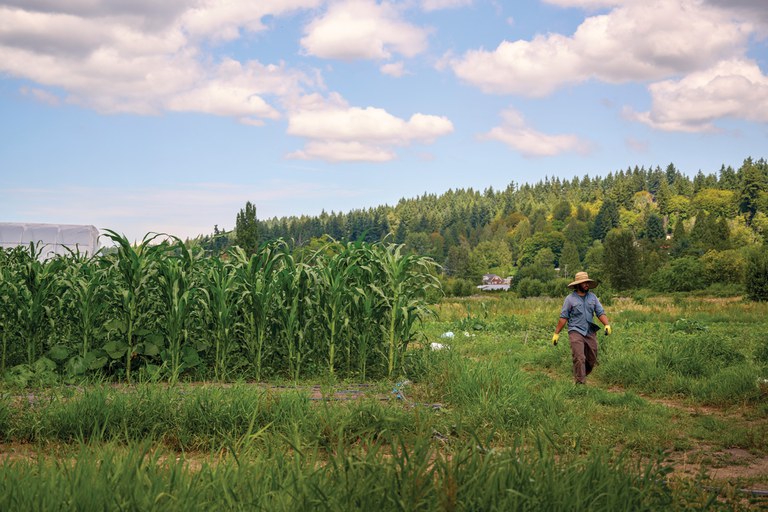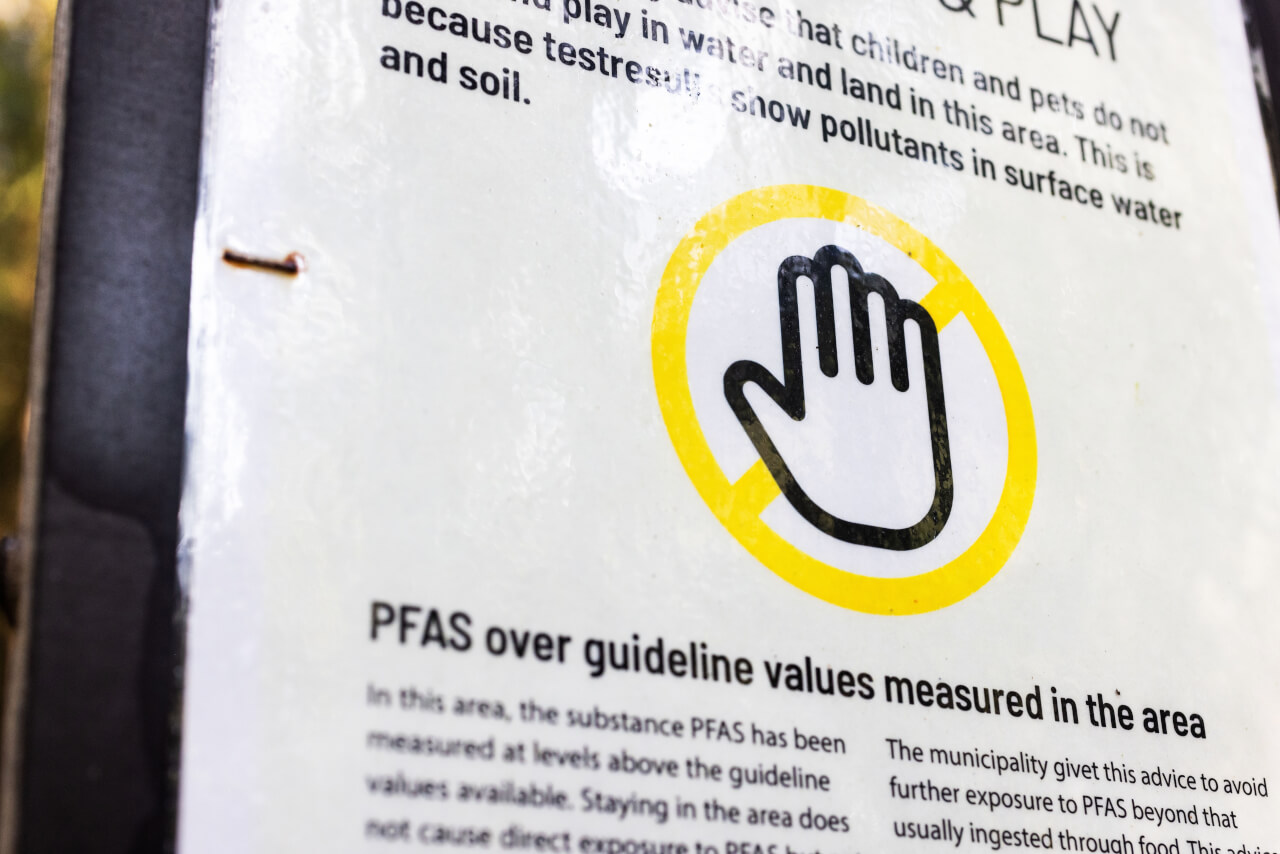[ad_1]
On a drizzly November day, Masra Clamoungou, the farm supervisor for Small Axe Farm, was preparing for winter. Small Axe is a part of a patchwork of farms east of Seattle, between the pine-filled Cascade foothills and the maple-lined banks of the Sammamish River. Through the rising season, the world appears like an unlimited produce aisle, striped with neat rows of kale, carrots, cabbage, peonies, blueberries, tomatoes and extra.
Clamoungou stood on the finish of a 100-foot-long crop mattress studded by the wilting leaves and sagging stalks of the final remaining collards. Clear tarps nailed to the ends of a half-finished greenhouse whipped within the wind behind him. Along with his arms unfold extensive, he dragged in lengths of a pliable black tube — drip tape, used for slow-release watering — that stretched the size of the row, twisting his torso as he doubled the tape over on itself. Subsequent, he deliberate to mow down the still-standing vegetation earlier than sowing rye and vetch, cowl crops that will maintain the soil in place in the course of the moist winter forward and repair nitrogen and different vitamins in it, prepared for the greens he’d seed the approaching spring.
Whereas the duvet crops prepped the land, Clamoungou and his crew prepped themselves, together with the gear, infrastructure and seedlings they’d want for a profitable rising season. Even on a compact farm like Small Axe, which spans solely 4 acres — the nationwide common is 446 acres — there was a lot to be performed: crop rotations to plan, greenhouse doorways to complete, a brand new shed to construct.
However, as a part of the nonprofit Black Farmers Collective, Small Axe is greater than only a place for rising meals. It’s additionally a spot for rising Black-owned farm-based companies and serving to the collective to meet its mission: constructing a Black-led meals system that heals and enlivens Seattle’s Black group. The collective collaborates with Black-led markets and meals banks, and brings individuals collectively to have a good time life and land, with its farms and farmers on the middle of its efforts.
Previous to founding the collective, Ray Williams, its govt director, was concerned in two small gardens in central and south Seattle, one in all which was tucked behind the Africatown Middle for Schooling and Innovation. Then, in 2018, the Black Farmers Collective fashioned to ascertain Sure Farm on a 1.5-acre plot in central Seattle, the place organizers host volunteer days, summer time cookouts, and meals and gardening courses.
In 2020, Williams realized that King County was trying to lease and reactivate fallow farmland within the Sammamish River Valley. Williams and Clamoungou inspected the weed-strewn land, talked about what they might do with it, utilized for the lease, and Small Axe Farm was born.

Small Axe Farm supervisor Masra Clamoungou (with shovel) works with different Black Farmers Collective members in July. (Photograph: Meron Menghistab/Excessive Nation Information)
Small Axe helps broaden the work the collective started at Sure Farm: addressing the epidemic of meals insecurity in Seattle’s Black group. In accordance with knowledge printed by Communities Rely, a useful resource supplied by Public Well being-Seattle & King County, almost a 3rd of Black Seattleites over the age of 18 expertise meals insecurity. By partnering with native meals banks, Black-led mutual help networks and different group teams, the collective distributes the meals it grows to these most in want.
“That’s one of many issues that first introduced me into farming,” Clamoungou mentioned, “having a tangible end result on the finish of the work, one thing that actually feeds the physique and feeds the souls of individuals.”
Past that, Small Axe is an area the place Black meals entrepreneurs can develop their companies and put together to sooner or later personal their very own land. Getting land into the fingers of Black farmers is essential to the collective’s mission due to centuries of dispossession: Regardless of being the soul, backbone and driving power of the early American financial system, previously enslaved African Individuals struggled to accumulate and maintain onto land post-Emancipation.
Black individuals by no means acquired any land-based reparations — the generally quoted 40 acres and a mule. Nonetheless, W.E.B. Dubois estimated that in 1875, Black farmers owned 3 million acres, lower than 1 p.c of the overall farmland recorded within the 1870 agricultural census. On the time, the inhabitants of the US was 12.6 p.c Black.
By 1910, Black possession of farmland had risen to 16 million acres, or simply beneath 2 p.c of all farmland; that 12 months, Black individuals accounted for greater than 10 p.c of the inhabitants. However simply over a century later, by 2017 — the 12 months of the newest agricultural census — Black farmers had misplaced most of that slim acquire, proudly owning now simply 0.5 p.c of all farmland, although Black individuals comprise over 14 p.c of the inhabitants.
Black Farmers Collective members are likely to the land at Small Axe Farm (left). Yeawa Asabi is one in all a number of farmers from the Seattle space studying farming methods and having access to land as a member of the collective (proper). (Pictures: Meron Menghistab/Excessive Nation Information)
Black of us misplaced their land not as a result of they lacked the power to farm or the will to do it, however due to wanton racial violence, predominantly within the South but additionally all through the Decrease 48. White mobs numbering within the lots of and hundreds dragged Black individuals by means of the streets and murdered them. White mobs hung Black individuals from bushes, riddled Black our bodies with bullets, raped Black ladies, burned Black males alive, drowned Black youngsters, beat Black individuals to loss of life, and minimize Black our bodies to bits for souvenirs. These home terrorists drove hundreds of thousands of Black of us to flee north and west in what grew to become often called the Nice Migration.
However escaping the South didn’t imply escaping white supremacy. Throughout the nation, white individuals weaponized the financial system towards Black farmers in a strategic and systematic effort to power them off their land. In a 2022 examine titled “Black land loss: 1920-1997,” College of Massachusetts Boston economist Dania Francis and her co-authors element the ways used towards Black farmers and the lasting impacts. Many banks refused to mortgage cash to Black farmers, making investments in infrastructure upgrades and upkeep all however unimaginable. When loans have been granted, in keeping with the examine, “one other frequent tactic was for a federal agent to delay a mortgage with a view to trigger a farmer to plant late, reap a smaller harvest, and find yourself in debt.” Black farmers have been excluded from the federal funds and regionally administered low-interest loans designed to help farmers in the course of the Nice Melancholy. And regardless of the passage of the 1964 Civil Rights Act, discrimination towards Black farmers persists.

Members of the Black Farmers Collective photographed at Small Axe Farm in July. (Photograph: Meron Menghistab/Excessive Nation Information)
All informed, Francis and her colleagues estimated the worth of the land and wealth Black farmers misplaced between 1920 and 1997 at $326 billion, adjusted for inflation — nonetheless only a sliver of the estimated $10 trillion racial wealth hole.
The Black Farmers Collective works to bridge a tiny portion of this chasm. That features hiring native Black cooks to cater Sure Farm cookouts, collaborating within the South Seattle Neighborhood Meals Hub in Seattle’s traditionally Black neighborhoods, instructing farmers new rising methods, connecting them with markets and produce consumers, and setting apart plots for brand spanking new farmers from the group.
This is a crucial boon for farmers who would in any other case battle to entry land round Seattle. Nationwide, a mean acre of farmland prices $3,800. In King County, it’s $35,000. And aspiring owners are on the hunt for parcels, too. “You’re competing with somebody that desires to place a home on 4 acres and is prepared to pay for it,” Williams mentioned.
In such a cutthroat atmosphere, among the best methods for brand spanking new, low-income farmers to entry land is with help from the county authorities. For the reason that Nineteen Eighties, King County has acquired over 15,000 acres of agricultural land and redistributed it by means of its Farmland Leasing Program, which is how the Black Farmers Collective acquired Small Axe.
This 12 months, together with the collective’s workers, Small Axe is house to 4 Black farmers who’re rising scorching peppers, cabbage, candy potatoes, artichokes and different crops on their very own plots. Clamoungou and Williams have been excited concerning the group sprouting alongside the crops on the farm, the place growers can encourage one another and share classes from successes and missteps alike. As Clamoungou put it, “That’s what we want: extra farmers, no more software program engineers.”
One other Small Axe grower chimed in: “No farmers, no life.”
This story was initially printed in Excessive Nation Information, an unbiased, reader-supported nonprofit media group that covers the vital points and tales that outline the Western United States.
[ad_2]
Source link






















